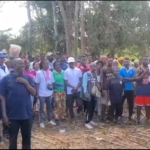
Residents of the Dodome traditional area in the Ho West District of the Volta Region are appealing to the Ghana Tourism Authority (GTA) to support the development of a unique historic and natural site in their community.
They believe the area has the potential to become one of the key tourism destinations in the region.
The Dodome enclave is made up of six farming communities: Awlime, Teleafenu, Tsikor, Dogblome, Avexa, and Awuiasu.
The potential tourist site, Todzi, was the first settlement of the forefathers of the land, who once lived on a rocky mountain.
These rocks formed natural shelters and tools for daily life, including surfaces shaped like talking drums, beds, wells that collected rainwater, and altars. Some stones also resemble umbrellas and other natural figures.
According to locals, their ancestors later moved from the rocky mountain to the foot of the hills, where the present-day Dodome communities are located.
They left in search of new opportunities, such as roads, schools, markets, and clean water. Today, the people honour this history through the Agadzi Za festival, celebrated every second Saturday in the month of November.
This annual celebration takes place after the Yam Festival of the Asogli State and the Hogbetsotso Festival of the Anlo State.
As part of this year’s celebrations, residents visited the ancestral settlement and renewed calls for tourism investment. “We have natural attractions here. You can see stones shaped like a coffin and a talking drum,” a resident shared.
Another community member added, “We are rebuilding the residence of our first chief, Togbe Kpangbatriku I. We need help from the Tourism Ministry and Non-Governmental Organisations to develop this place.”
Local leaders say they will begin restoration efforts themselves as they wait for government support.
The Ho West District already hosts popular tourism sites, including Mount Gemi, the Amedzofe canopy walkway, and rich rainforests home to rare species.
The people of Dodome believe that with the right investment, their ancestral home can become another exciting destination for tourists, promoting culture, history, and sustainable community development.



